- Home
- Scott Mariani
The Moscow Cipher Page 2
The Moscow Cipher Read online
Page 2
Its destination was the infamous Lubyanka prison and KGB headquarters in the heart of Moscow, where men highly expert in extracting the truth from their victims awaited their new arrival.
The last night of Leo Ingram’s life would be a very long and agonising one.
Chapter 1
The present day
Inside the confessional, filled with the serenity of the magnificent cathedral that was one of only two Catholic churches in his home city of Moscow, Yuri Petrov knelt humbly on the step and prepared to bare his soul to God.
On the other side of the grid, the priest’s face was half veiled in shadow. Yuri made the sign of the cross and, speaking low, began the sacrament as he’d been doing all his life.
‘Forgive me, Father, for I have sinned. My last confession was over two weeks ago and these are my sins.’
Yuri ran through the list of various lesser, venial sins, such as drinking and occasionally skipping his nightly prayers. But it was something else that was weighing so heavily on him and was the real reason he’d come seeking guidance. ‘I’m struggling with a great burden, Father,’ he explained nervously. ‘A terrible secret has been revealed to me and I don’t know what to do. I’m frightened.’
The priest listened sagely. ‘Would the right course of action be to share your secret, my son?’
‘Yes, Father. But in so doing, I could be in serious danger.’
‘The only danger is in doing wrong, my son.’
‘I know it’s wrong to lie, or hide the truth. I’ve done that too many times, Father. I’ve been used to keeping secrets, in my past career. But nothing like this. If I tell, I’m a dead man. I need God’s guidance on what to do.’
The priest reflected on this in silence for some time. ‘Pray to Him, my son. Open your heart to His wisdom, and the guidance you seek will be heard.’ Having given his counsel, the priest gave Yuri the penance of two Hail Marys, invited him to make an act of contrition, and ended the sacrament with the usual ‘Through the ministry of the Church, may God give you pardon and peace. I absolve you of your sins, in the name of the Father, and of the Son, and of the Holy Spirit.’
‘Amen.’
‘Go in peace. Do the right thing, my son.’
Yuri left the Cathedral of the Immaculate Conception and trudged down the steps to Malaya Gruzinskaya Street feeling scarcely any more reassured than before. Moscow was enjoying a warm June; the sky was blue and the sunshine was pleasant, but Yuri was too taken up with confusion and dread to notice. How had it come to this, he kept asking himself. As he walked away from the grand Gothic church, he cast his troubled mind back over the events of the last few days and the path his life had taken to lead him to this awful situation.
Yuri Petrov was thirty-nine years old, divorced, single, currently unemployed and going nowhere fast. The reason he’d been so used to keeping secrets in the past was that, for over fifteen years, he had been a spy for Russian intelligence, albeit a minor and lowly one. Not that any of his former neighbours or acquaintances in Amsterdam, where he had lived for ten of those years, would have known it. As far as anyone was concerned, even (especially) Yuri’s ex-wife Eloise and their daughter Valentina, he led the steady, plodding and unexciting existence of a senior technical support analyst working for an international software company based in the Netherlands. The ability to speak Russian being a key part of his phony job, the story fitted well and he’d carried it off for years without drawing suspicion. Each morning at eight he’d kissed his wife and cycled off to a fake office with a fake secretary, and got on with the real job of being an intelligence spook. Whatever that was, exactly.
While the Russian secret service had been stepping up its spying activities across Europe for some time and deploying their spooks on all kinds of cool missions such as nabbing state secrets, orchestrating cyber-attacks, infiltrating protest groups and generally helping to subvert the stability of nations, to Yuri’s chagrin he felt his own talents to have been woefully underused. He was not, never had been, Russia’s answer to James Bond. He had never carried, nor even handled, a gun, or been asked to do anything remotely risky. His role in Amsterdam was ostensibly to keep tabs on the intelligence agents of rival nations, but it seemed that his counterparts there had as little to do as he did – which all amounted to a life not much less drab and uninspiring than his fictitious cover, in which he had little to do except trawl the internet, drink too much coffee, eat too much stroopwafel, and become increasingly dissatisfied and frustrated with his career.
It hadn’t always been this way. Once upon a time, in the bygone days before he’d been sent into exile in Amsterdam, his Intelligence bosses had seemed to appreciate Yuri’s abilities. For Yuri might not have been endowed with many talents in his life, but for some reason and with very little effort on his part he just so happened to be a highly gifted code-cracker. Back in the day, Yuri’s capacity for deciphering signals intelligence – or ‘SIGINT’ as the Americans termed it – encryptions intercepted from rival agencies such as the Brits, the Yanks or those pesky Israelis had been second to none and earned him quite a reputation in Moscow. On several occasions, when Russian Intel operatives way above his pay grade had been unable to penetrate the firewalls protecting the secret files of MI6, CIA, Mossad and others, Yuri had been called in to assist. He’d cracked security passcodes that had been thought uncrackable, even complex fifteen-digit monsters that presented over 700 million billion billion permutations.
But that was long ago, before the relentless march of technology had taken all the intellectual challenge out of codebreaking and pretty much rendered talents like his obsolete. Nowadays it was all just a war between computers: one to weave the incredibly complex code, another to attack its defences, and the winner was simply whoever had the most powerful machine. With alarming rapidity, the human factor was being almost completely removed from the equation. After just a few years in the job, Yuri’s special skills had become increasingly redundant. Then came the Amsterdam posting, and the long, slow decline. Frustration grew to bitterness; bitterness to hatred: against his employers back home, and the whole damn government.
During this unhappy period he hooked back up with an old friend from school and began regular contact with him on social media. Yuri Petrov and Grisha Solokov had known each other since the age of seven, and had the usual on-off friendship until their teens, when they’d become best buddies for a while until Yuri drifted off to university in St Petersburg to study IT and Grisha went to work for his father, who owned a radio repair shop.
During the years the two friends had been out of touch, Grisha had discovered the wonderful world of conspiracy theories and become deeply immersed. The repair shop long gone, he now operated his own internet radio station from a hidden trailer at a remote farm many miles from Moscow. He lived alone with only a dog, an assortment of feral cats and a few goats and chickens for company, and spent most of every night in the trailer streaming his rants about everything from illegal government surveillance operations to chemtrails to the Illuminati plot to enslave the human race to the covert deportation camps that really existed, according to him, on Mars.
Needless to say, in their Facebook chats Yuri had never divulged to his friend what he did for a living, for that would have instantly branded him as the enemy. Grisha had his own secrets, too. Because his show frequently attacked what he considered to be the corrupt dark underbelly of the Russian state and its president in particular, he kept his location extremely hush-hush so as to elude the government assassins who he believed were intent on silencing him.
In short, Grisha was slightly nuts.
Looking back, Yuri couldn’t pinpoint the moment he’d started getting drawn into Grisha’s ideology. To begin with, he’d been dismissively sceptical of the whole thing, and almost stopped with the social media contact. The stuff his friend came out with was often more than Yuri could stomach, like his conviction that lizard-like alien beings capable of taking on human form really do run the
planet, and that various celebrities as well as members of the British royal family were among these evil creatures hellbent on the total domination of humanity. But the more he’d listened to Grisha’s show, the more compelling Yuri started finding its less wacky theories of conspiracy and corruption at the heart of the global establishment. After all, Yuri was privy to facts and secrets that were kept from ordinary folks, and so it wasn’t hard for him to imagine that all kinds of levels of secrecy existed above him. Gradually, tiny doubts about his own government, and the state of the world generally, percolated through his head and wouldn’t go away, feeding his increasing sense of restlessness that he was a pawn working for dark powers.
Maybe it was just an expression of his dissatisfaction with his own job, he told himself. Yet the same creeping paranoia that fuelled Grisha’s radio show started haunting Yuri as he cycled the streets of Amsterdam. He became certain he was being watched and followed, his phone tapped, perhaps even his thoughts somehow monitored. A reasonably devout Catholic since his teens, he turned to God for moral support. When an answer to his fervent prayers failed to materialise, Yuri found solace in the sins of drink and marijuana, having developed a taste for both.
What made it so much worse was that he could never tell Eloise a word about his secret life, let alone the anxieties that plagued him. As a result he ended up barely speaking to her at all, with the inevitable consequence that she felt very neglected by him. When the marriage eventually fell apart, Yuri blamed the Russian intelligence services even more bitterly for his woes and took it as proof of their pernicious influence over society. Shortly after Eloise left him and took Valentina away to live in France, Yuri returned to Moscow, handed in his resignation and found alternative employment fixing computer bugs for private cash-paying customers. He managed to persuade Eloise to let Valentina, now ten, travel to Russia for visits. Eloise was difficult about it and barely spoke to him on the phone.
Yuri’s preoccupation with all things conspiracy-related had by then grown even more pervasive. Even if he wasn’t yet prepared to believe that shape-shifting alien lizards govern the planet, as a parent he was angry that his child would grow up as a drone of the globalist Deep State. He felt he needed to do something to make people wake up to the realisation that everything they thought they knew about the world was a lie. The media they trusted was simply an instrument for propaganda; the leaders they voted for in fact controlled nothing; the real rulers were hidden in the shadows and the whole concept of democracy was a carefully concocted myth.
He and Grisha now communicated daily on prepaid phones bought for cash and theoretically untraceable to them. On Grisha’s advice, as an extra precaution Yuri followed his friend’s practice of replacing his ‘burner’ every couple of weeks. As a means of living as much off the grid as possible in an urban environment, he also moved to a dingy hole of an apartment that he paid for in cash, utility bills all in the name of a former tenant.
He and Grisha started meeting in person. The first reunion took place at a bar in a small town eighty kilometres from Moscow. Later, as a sign of his growing trust, Grisha let Yuri in on the secret of his farm’s location, way out in the remote countryside. Never had Yuri mentioned his past as a spook for Russian intelligence. That was history now, anyway.
Over the next couple of years, Yuri visited the farm often. The two friends would spend days and nights in Grisha’s chaotic home drinking vodka and talking conspiracies. It was more than a hobby or belief system for Grisha, it was a total lifestyle. Yuri felt the infectious lure of that world. He was becoming seriously addicted.
‘It’s all building to a head, don’t you see?’ Grisha had kept insisting during their most recent late-night session. ‘It’s coming. Just you wait. Something’s going to happen that’ll prove everything we’ve been saying. Something that’ll show the world what these bastards have really been up to all along. Nobody will be laughing at us then.’
‘“Something”?’
‘Something huge, my man.’
Yuri believed it too, even if neither of them knew what that ‘something’ could be.
Then, one sunny day in June two years after he’d left Amsterdam, Grisha’s prediction came terrifyingly true, in a way neither of them could have imagined.
Chapter 2
For a dedicated conspiracy buff tainted by more than a whiff of paranoia, nothing could be more alarming than happening to be walking down the street minding your own business when a mysterious black car full of mysterious men suddenly appears from nowhere and pulls up beside you.
That was exactly what happened to Yuri Petrov one day that summer as he strolled aimlessly about the streets of Moscow. He instantly knew the black Mercedes was an Intelligence Services car. Gripped by panic, he was ready to bolt as the back doors opened and two men, very obviously government agents, climbed out and walked calmly towards him.
He’d never seen either of them before. But they seemed to recognise him, even with the hair and the beard. Yuri hadn’t been paying so much attention to personal neatness of late.
‘Hello, Yuri,’ one of them said.
The other motioned towards the car’s open door. ‘Let’s go for a drive, shall we?’
Powerless to refuse, Yuri climbed into the back seat. The two men sat flanking him as the Mercedes sped off. ‘What’s this about?’ he kept repeating. ‘Who are you people? What do you want with me?’
‘You’ll find out soon enough. Shut up and enjoy the ride.’
Twenty minutes later, the Mercedes arrived at a lugubrious government building Yuri had never visited before. They passed through two armed security checkpoints, then whooshed down a ramp into a subterranean car park from where Yuri’s escorts ushered him up several floors in a lift. They stepped out into a corridor that was devoid of any windows or furniture and painted institutional grey. Yuri was so nervous he could hardly control the shaking in his knees as they led him up the corridor. After two years of the Grisha Solokov academy, it seemed to Yuri like the dystopian nightmare coming true.
Yuri had no idea of what he was about to step into.
The agents stopped outside an unmarked door. ‘Go in,’ one said to Yuri.
Yuri did as he was told. He found himself in an office, not a cosy one. The walls and steel filing cabinets and ancient iron radiators and exposed pipes were all painted the same grey as the corridor. There was no carpet and only one window, through whose dusty glass little sunlight was able to penetrate. In front of the window was a large, plain desk, which was completely bare except for a telephone and a slim cardboard folder that lay closed on the desktop.
Behind the desk sat a man whom Yuri, unlike the men who had brought him here, did in fact recognise. It was his former chief, the man who had first interviewed and employed him in the service, Antonin Bezukhov.
The chief was a large, heavyset figure in a dark suit. His white hair was buzzed military-short and his face appeared to have been chiselled from a lump of granite. He had to be in his mid-seventies, but if anything he looked more severe and intimidating than Yuri remembered, which was saying something. This was a man rumoured to have personally executed several CIA operatives, back in the glory days of the Cold War. As far as Bezukhov was concerned, the old regime had never ended.
Bezukhov invited him to sit, and offered him a ghost of a smile. ‘You’re a hard man to find, Yuri. We obviously trained you too well. Where’ve you been hiding yourself these days?’
Yuri swallowed. ‘Why am I here? What do you want from me?’
‘We need you to come back and work for us, one more time,’ said Bezukhov.
‘But I’m retired,’ Yuri protested. ‘Out, gone, done with the whole thing. I don’t want anything more to do with any of it.’
‘Consider this your heroic comeback,’ the chief said, faintly amused. ‘Come on, Yuri, don’t you know that once you’re in the club, we’d never really let you go? That’s how the game is played, my friend. And now we have another job for you.’
Yuri could find nothing to say. Bezukhov reached a thick arm across the desk, and a brawny paw of a hand slid the solitary card folder over its surface towards Yuri. ‘Open it.’
Again, Yuri did as he was told. Inside the card folder was a transparent plastic sleeve, and inside that a single oblong slip of paper. It was heavily aged, as if it had spent many years exposed to the elements. And creased, as though it had been folded up very small throughout that time. Long ago, someone had written four lines of text on the paper, using black ink that had faded somewhat but was still clearly legible. The writing wasn’t in Russian. It used the letters of the English alphabet, though the language wasn’t English either.
‘It’s a cipher,’ Yuri said. An old one, too, dating back a good few decades. Seeing it, he couldn’t pretend not to feel a slight stirring of curiosity.
‘Good to see you haven’t lost your powers of observation, Agent Petrov.’
‘Please don’t call me that.’
‘This cipher is the reason I called you in,’ the chief said. ‘You’re going to decode it for us. Just like old times.’
Yuri studied the cipher more closely. Right away, he could tell it was like no other code he’d come across before. Even back in the pre-cybertechnology dark ages, cryptology had reached a level that was far from crude. ‘It’s not going to be easy.’
‘Why do you think we selected you for the task?’ the chief said. ‘Some people haven’t forgotten you used to have a way with these things, back in the old days before these fucking computers took over.’ He spat out the expletive with surprising bitterness.
As Yuri went on peering at the encrypted text, the chief recomposed himself and explained, ‘The cipher was discovered two weeks ago by a crew of workmen who were demolishing a block of old post-war houses in Novogireyevo District. Coming across an envelope that had been crammed into a crack in a wall, they opened it, saw it was something peculiar and handed it in to the police. Thank God for patriotism, heh?’

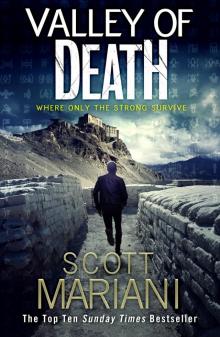 Valley of Death
Valley of Death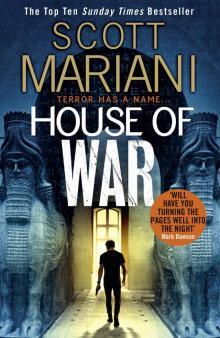 House of War
House of War The Pandemic Plot
The Pandemic Plot The Pretender's Gold
The Pretender's Gold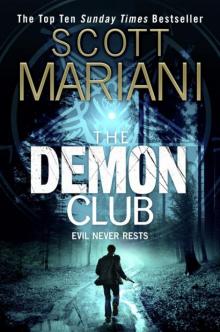 The Demon Club
The Demon Club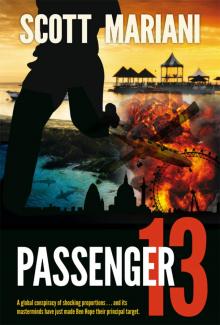 Passenger 13 (Ben Hope eBook originals)
Passenger 13 (Ben Hope eBook originals)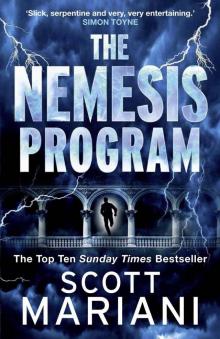 The Nemesis Program_Ben Hope
The Nemesis Program_Ben Hope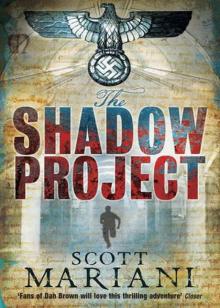 The Shadow Project
The Shadow Project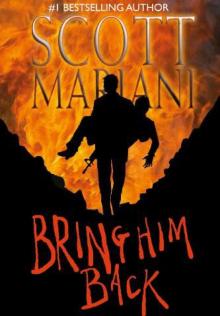 Bring Him Back
Bring Him Back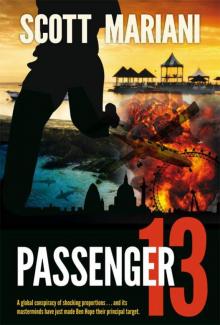 Passenger 13
Passenger 13 Sacred Sword (Ben Hope 7)
Sacred Sword (Ben Hope 7) The Sacred Sword (Ben Hope 7)
The Sacred Sword (Ben Hope 7) Sacred Sword
Sacred Sword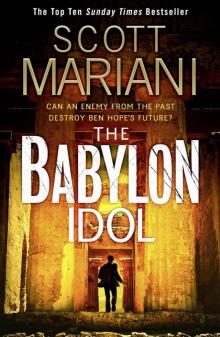 The Babylon Idol
The Babylon Idol The Armada Legacy
The Armada Legacy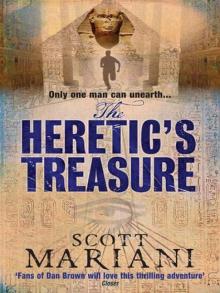 The Heretic's Treasure
The Heretic's Treasure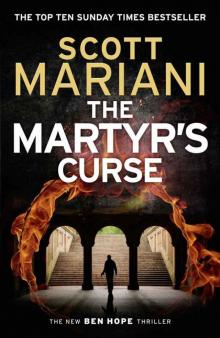 The Martyr’s Curse
The Martyr’s Curse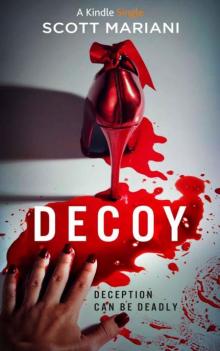 DECOY (Kindle Single)
DECOY (Kindle Single) The Bach Manuscript
The Bach Manuscript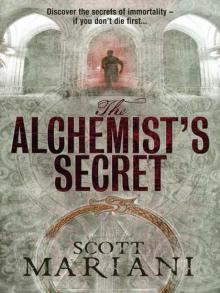 The Alchemist's Secret
The Alchemist's Secret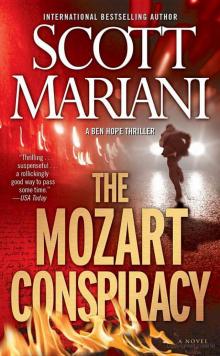 The Mozart Conspiracy: A Novel bh-2
The Mozart Conspiracy: A Novel bh-2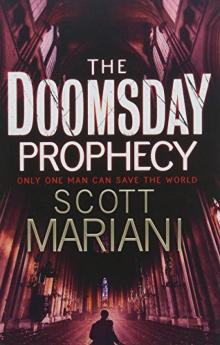 The Doomsday Prophecy
The Doomsday Prophecy The Ben Hope Collection: 6 BOOK SET
The Ben Hope Collection: 6 BOOK SET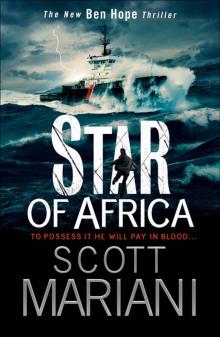 Star of Africa (Ben Hope, Book 13)
Star of Africa (Ben Hope, Book 13)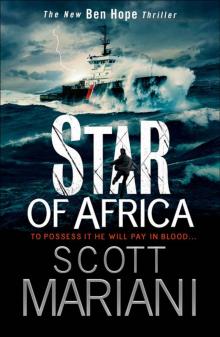 Star of Africa
Star of Africa The Forgotten Holocaust (Ben Hope, Book 10)
The Forgotten Holocaust (Ben Hope, Book 10)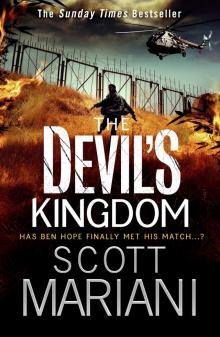 The Devil's Kingdom
The Devil's Kingdom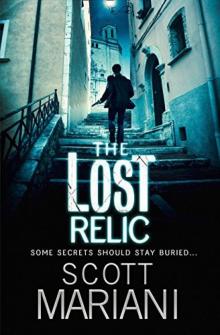 The Lost Relic
The Lost Relic The Armada Legacy bh-8
The Armada Legacy bh-8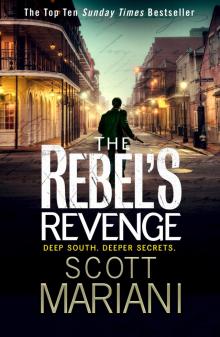 The Rebel's Revenge
The Rebel's Revenge The Forgotten Holocaust
The Forgotten Holocaust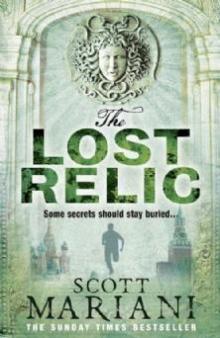 The Lost Relic bh-6
The Lost Relic bh-6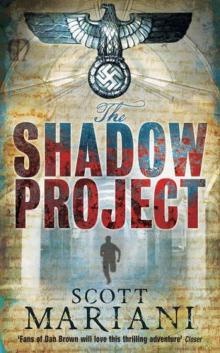 Ben Hope 05 - The Shadow Project
Ben Hope 05 - The Shadow Project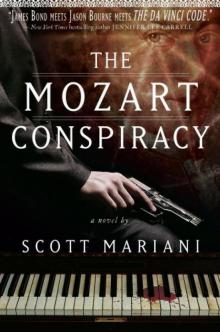 The Mozart Conspiracy
The Mozart Conspiracy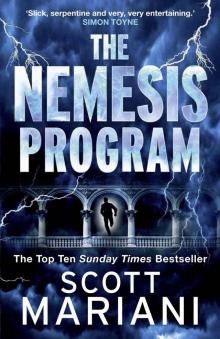 The Nemesis Program
The Nemesis Program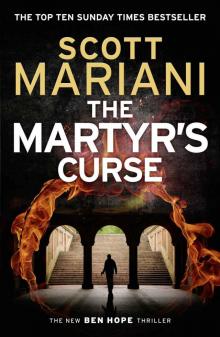 The Martyr’s Curse (Ben Hope, Book 11)
The Martyr’s Curse (Ben Hope, Book 11) THE TUNNEL: A Ben Hope Story
THE TUNNEL: A Ben Hope Story The Sacred Sword bh-7
The Sacred Sword bh-7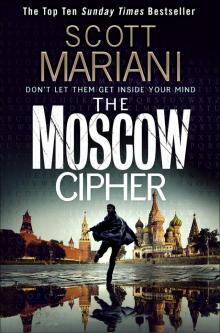 The Moscow Cipher
The Moscow Cipher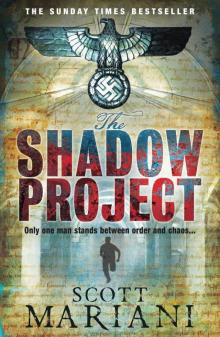 The Shadow Project bh-5
The Shadow Project bh-5 The Tunnel
The Tunnel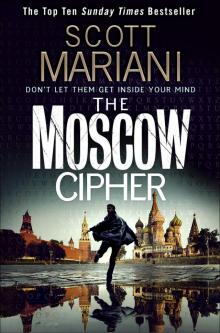 The Moscow Cipher (Ben Hope, Book 17)
The Moscow Cipher (Ben Hope, Book 17)